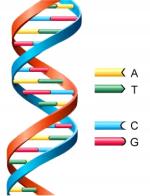|
This section contains 1,678 words (approx. 6 pages at 300 words per page) |

|
DNA, or deoxyribonucleic acid, is the genetic material that codes for the components that make life possible. Both prokaryotic and eukaryotic organisms contain DNA. An exception is a few viruses that contain ribonucleic acid, although even these viruses have the means for producing DNA.
The DNA of bacteria is much different from the DNA of eukaryotic cells such as human cells. Bacterial DNA is dispersed throughout the cell, while in eukaryotic cells the DNA is segregated in the nucleus, a membrane-bound region. In eukaryotics, structures called mitochondria also contain DNA. The dispersed bacterial DNA is much shorter than eukaryotic DNA. Hence the information is packaged more tightly in bacterial DNA. Indeed, in DNA of microorganisms such as viruses, several genes can overlap with each other, providing information for several proteins in the same stretch of nucleic acid. Eukaryotic DNA contains large intervening regions between...
|
This section contains 1,678 words (approx. 6 pages at 300 words per page) |

|


